新视界大学英语综合教程3 1、2、5、7单元课后翻译
- 格式:doc
- 大小:48.00 KB
- 文档页数:4
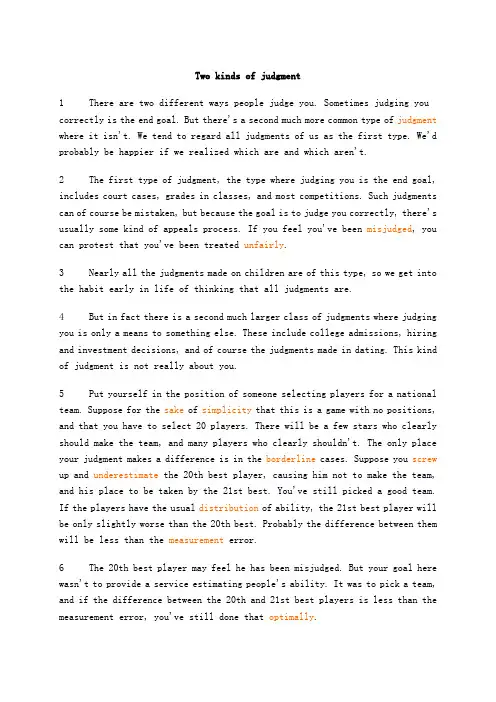
Two kinds of judgment1 There are two different ways people judge you. Sometimes judging you correctly is the end goal. But there's a second much more common type of judgment where it isn't. We tend to regard all judgments of us as the first type. We'd probably be happier if we realized which are and which aren't.2 The first type of judgment, the type where judging you is the end goal, includes court cases, grades in classes, and most competitions. Such judgments can of course be mistaken, but because the goal is to judge you correctly, there's usually some kind of appeals process. If you feel you've been misjudged, you can protest that you've been treated unfairly.3 Nearly all the judgments made on children are of this type, so we get into the habit early in life of thinking that all judgments are.4 But in fact there is a second much larger class of judgments where judging you is only a means to something else. These include college admissions, hiring and investment decisions, and of course the judgments made in dating. This kind of judgment is not really about you.5 Put yourself in the position of someone selecting players for a national team. Suppose for the sake of simplicity that this is a game with no positions, and that you have to select 20 players. There will be a few stars who clearly should make the team, and many players who clearly shouldn't. The only place your judgment makes a difference is in the borderline cases. Suppose you screw up and underestimate the 20th best player, causing him not to make the team, and his place to be taken by the 21st best. You've still picked a good team. If the players have the usual distribution of ability, the 21st best player will be only slightly worse than the 20th best. Probably the difference between them will be less than the measurement error.6 The 20th best player may feel he has been misjudged. But your goal here wasn't to provide a service estimating people's ability. It was to pick a team, and if the difference between the 20th and 21st best players is less than the measurement error, you've still done that optimally.7 It's a false analogy even to use the word unfair to describe this kind of misjudgment. It's not aimed at producing a correct estimate of any given individual, but at selecting a reasonably optimal set.8 One thing that leads us astray here is that the selector seems to be ina position of power. That makes him seem like a judge. If you regard someone judging you as a customer instead of a judge, the expectation of fairness goes away. The author of a good novel wouldn't complain that readers were unfair for preferring a potboiler with a racy cover. Stupid, perhaps, but not unfair.9 Our early training and our self-centeredness combine to make us believe that every judgment of us is about us. In fact most aren't. This is a rare case where being less self-centered will make people more confident. Once you realize how little most people judging you care about judging you accurately—once you realize that because of the normal distribution of most applicant pools, it matters least to judge accurately in precisely the cases where judgment has the most effect—you won't take rejection so personally.10 And curiously enough, taking rejection less personally may help you to get rejected less often. If you think someone judging you will work hard to judge you correctly, you can afford to be passive. But the more you realize that most judgments are greatly influenced by random, extraneous factors—that most people judging you are more like a fickle novel buyer than a wise and perceptive magistrate—the more you realize you can do things to influence the outcome.11 One good place to apply this principle is in college applications. Most high school students applying to college do it with the usual child's mix of inferiority and self-centeredness: inferiority in that they assume that admissions committees must be all-seeing; self-centeredness in that they assume admissions committees care enough about them to dig down into their application and figure out whether they're good or not. These combine to make applicants passive in applying and hurt when they're rejected. If college applicants realized how quick and impersonal most selection processes are, they'd make more effort to sell themselves, and take the outcome less personally.两种判断判断一个人有两种不同的方式,有时判断的最终目的是正确地判断一个人,不过另外一种则不是如此,并且这种判断要常见得多。

Unit 1Active reading独立思考直到现在,独立思考仍然是一种激进的行为。
独立思考本应该是一种普遍的行为,但事实并非如此。
我们社会的每一次重大进步都源于独立思考。
然而,在大多数圈子里,尤其是在我们生活中的重要场所——如家庭、学校以及大部分工作场所——独立思考受到人们的质疑。
有些机构甚至故意压制独立思考,把它视作危险行为。
在一次晚会上,有一位客人问起我酝酿中的一本书的主题,他让我想起了这个令人悲哀的事实。
我告诉他这本书是关于人们如何相互帮助,培养独立思考能力的。
“啊,天哪!”他说,“我觉得这个主题不怎么好,我更希望人们按指令行事。
”后来我才发现他是一家大公司的第四代掌门人,而这家公司是世界上最大的石油公司之一。
“……要把我们公司发展成一个典范的工作环境,其中各层次的人都能够独立思考。
”你最后一次看到包含上述字眼的机构愿景陈述是在什么时候?而且,最后一次有人问你:“你能说说真心话吗?真心话!”,然后等着你最终给出充分的答案,那又是在什么时候?我们对于缺乏独立思考已习以为常了。
很少有人受到鼓励进行独立思考,更别提接受相关的训练,就连他们的老师、父母和老板也是如此。
而且他们的老师、父母和老板也是如此。
(我们也许已经知道要尊敬像苏格拉底这样的思想家,但同时我们也知道,他正是因为独立思考而被雅典城判处死刑,服毒而亡——这绝非是对独立思考完完全全的鼓励。
)可是,偶尔我们确实能遇到一位真心想让我们发展独立思考能力的人。
他们让我们对独立思考的重要性有了浅略的认识。
我13 岁时被安排学习一门高等代数课程。
这门课的老师曾因迫使学生思考而遭到学生的中伤。
上第一节课时,她站在黑板前说道:“在你们面前的纸上写出一个数字之和。
”全班35个少男少女都愣愣地看着她。
她把要求又重复了一遍:“写出一个数字之和。
”我记得当时握铅笔的手都攥出了汗。
有几个人把头低下,动笔写起来。
我纳闷他们究竟在写些什么。
我看见跟我隔着过道的那个女同学向前探了一下身子,从前座男生的肩膀上方偷窥他正在草草写些什么。
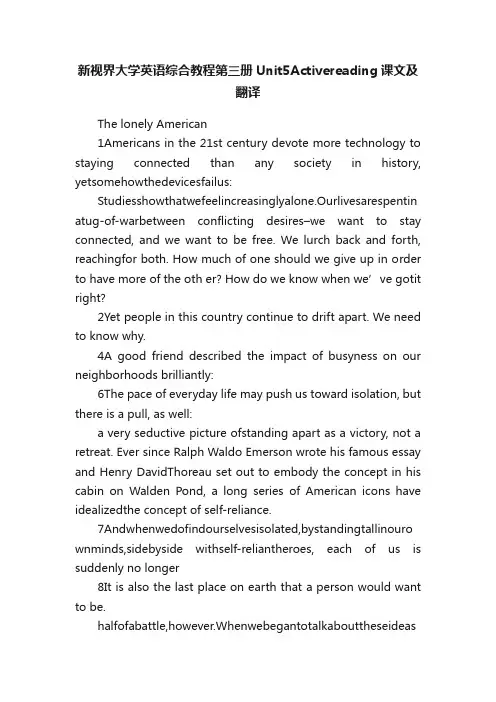
新视界大学英语综合教程第三册Unit5Activereading课文及翻译The lonely American1Americans in the 21st century devote more technology to staying connected than any society in history, yetsomehowthedevicesfailus:Studiesshowthatwefeelincreasinglyalone.Ourlivesarespentin atug-of-warbetween conflicting desires–we want to stay connected, and we want to be free. We lurch back and forth, reachingfor both. How much of one should we give up in order to have more of the oth er? How do we know when we’ve gotit right?2Yet people in this country continue to drift apart. We need to know why.4A good friend described the impact of busyness on our neighborhoods brilliantly:6The pace of everyday life may push us toward isolation, but there is a pull, as well:a very seductive picture ofstanding apart as a victory, not a retreat. Ever since Ralph Waldo Emerson wrote his famous essay and Henry DavidThoreau set out to embody the concept in his cabin on Walden Pond, a long series of American icons have idealizedthe concept of self-reliance.7Andwhenwedofindourselvesisolated,bystandingtallinouro wnminds,sidebyside withself-reliantheroes, each of us is suddenly no longer8It is also the last place on earth that a person would want to be.halfofabattle,however.Whenwebegantotalkabouttheseideaswithfriends,theirfirstresp onsewastopassionately defend their styles of staying disconnected. Having chosen, like so many Americans, to step back, theyexplained how right the choice has been for them.can lead people to work a little harder to reconnect.13Loneliness was never the goal. It’s just the spot where too many people wind up. We get stuck because theworldwehavewanderedawayfromissofranticanddemanding.W egetstuckbecausew ehavedreamedaboutlonesome heroes who stand defiantly apart. We get stuck because we feel left out and stop looking for ways back in.We should rember that the outside was not meant to be our final destination.孤独的xx人1在使人与人保持联系方面,21世纪的美国人投入了比历史上任何一个社会都要多的技术手段。
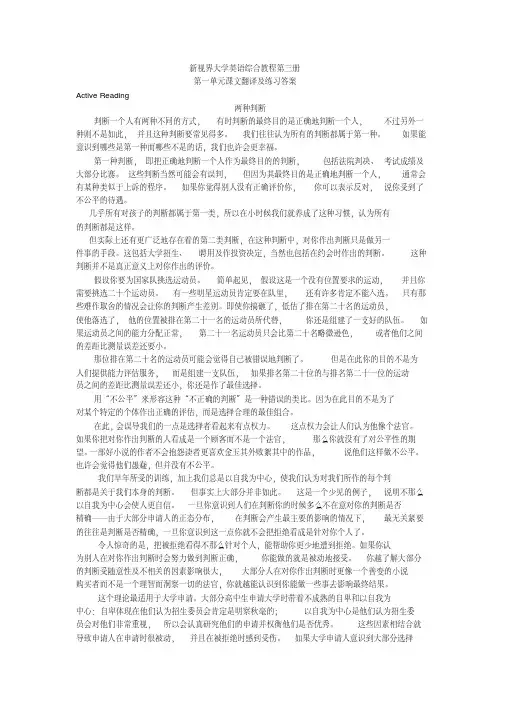
新视界大学英语综合教程第三册第一单元课文翻译及练习答案Active Reading两种判断判断一个人有两种不同的方式,有时判断的最终目的是正确地判断一个人,不过另外一种则不是如此,并且这种判断要常见得多。
我们往往认为所有的判断都属于第一种。
如果能意识到哪些是第一种而哪些不是的话,我们也许会更幸福。
第一种判断,即把正确地判断一个人作为最终目的的判断,包括法院判决、考试成绩及大部分比赛。
这些判断当然可能会有误判,但因为其最终目的是正确地判断一个人,通常会有某种类似于上诉的程序。
如果你觉得别人没有正确评价你,你可以表示反对,说你受到了不公平的待遇。
几乎所有对孩子的判断都属于第一类,所以在小时候我们就养成了这种习惯,认为所有的判断都是这样。
但实际上还有更广泛地存在着的第二类判断,在这种判断中,对你作出判断只是做另一件事的手段。
这包括大学招生、聘用及作投资决定,当然也包括在约会时作出的判断。
这种判断并不是真正意义上对你作出的评价。
假设你要为国家队挑选运动员。
简单起见,假设这是一个没有位置要求的运动,并且你需要挑选二十个运动员。
有一些明星运动员肯定要在队里,还有许多肯定不能入选。
只有那些难作取舍的情况会让你的判断产生差别。
即使你搞砸了,低估了排在第二十名的运动员,使他落选了,他的位置被排在第二十一名的运动员所代替,你还是组建了一支好的队伍。
如果运动员之间的能力分配正常,第二十一名运动员只会比第二十名略微逊色,或者他们之间的差距比测量误差还要小。
那位排在第二十名的运动员可能会觉得自己被错误地判断了。
但是在此你的目的不是为人们提供能力评估服务,而是组建一支队伍,如果排名第二十位的与排名第二十一位的运动员之间的差距比测量误差还小,你还是作了最佳选择。
用“不公平”来形容这种“不正确的判断”是一种错误的类比。
因为在此目的不是为了对某个特定的个体作出正确的评估,而是选择合理的最佳组合。
在此,会误导我们的一点是选择者看起来有点权力。
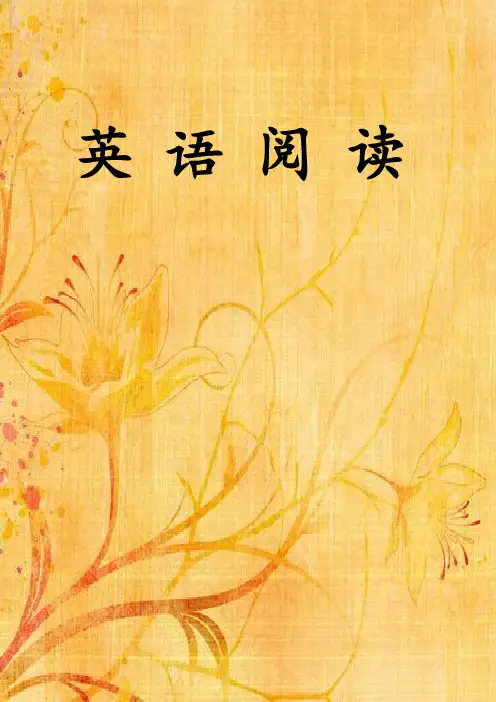
英语阅读第一单元课文翻译 Active Reading两种判断判断一个人有两种不同的方式,有时判断的最终目的是正确地判断一个人,不过另外一种则不是如此,并且这种判断要常见得多。
我们往往认为所有的判断都属于第一种。
如果能意识到哪些是第一种而哪些不是的话,我们也许会更幸福。
第一种判断,即把正确地判断一个人作为最终目的的判断,包括法院判决、考试成绩及大部分比赛。
这些判断当然可能会有误判,但因为其最终目的是正确地判断一个人,通常会有某种类似于上诉的程序。
如果你觉得别人没有正确评价你,你可以表示反对,说你受到了不公平的待遇。
几乎所有对孩子的判断都属于第一类,所以在小时候我们就养成了这种习惯,认为所有的判断都是这样。
但实际上还有更广泛地存在着的第二类判断,在这种判断中,对你作出判断只是做另一件事的手段。
这包括大学招生、聘用及作投资决定,当然也包括在约会时作出的判断。
这种判断并不是真正意义上对你作出的评价。
假设你要为国家队挑选运动员。
简单起见,假设这是一个没有位置要求的运动,并且你需要挑选二十个运动员。
有一些明星运动员肯定要在队里,还有许多肯定不能入选。
只有那些难作取舍的情况会让你的判断产生差别。
即使你搞砸了,低估了排在第二十名的运动员,使他落选了,他的位置被排在第二十一名的运动员所代替,你还是组建了一支好的队伍。
如果运动员之间的能力分配正常,第二十一名运动员只会比第二十名略微逊色,或者他们之间的差距比测量误差还要小。
那位排在第二十名的运动员可能会觉得自己被错误地判断了。
但是在此你的目的不是为人们提供能力评估服务,而是组建一支队伍,如果排名第二十位的与排名第二十一位的运动员之间的差距比测量误差还小,你还是作了最佳选择。
用‚不公平‛来形容这种‚不正确的判断‛是一种错误的类比。
因为在此目的不是为了对某个特定的个体作出正确的评估,而是选择合理的最佳组合。
在此,会误导我们的一点是选择者看起来有点权力。
这点权力会让人们认为他像个法官。
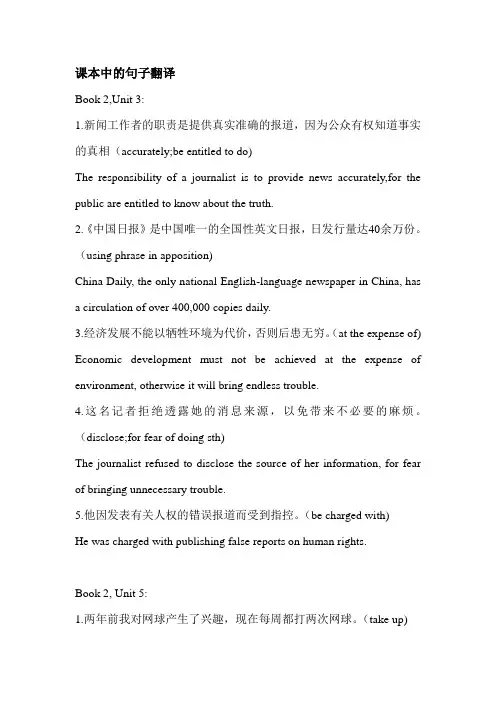
课本中的句子翻译Book 2,Unit 3:1.新闻工作者的职责是提供真实准确的报道,因为公众有权知道事实的真相(accurately;be entitled to do)The responsibility of a journalist is to provide news accurately,for the public are entitled to know about the truth.2.《中国日报》是中国唯一的全国性英文日报,日发行量达40余万份。
(using phrase in apposition)China Daily, the only national English-language newspaper in China, hasa circulation of over 400,000 copies daily.3.经济发展不能以牺牲环境为代价,否则后患无穷。
(at the expense of) Economic development must not be achieved at the expense of environment, otherwise it will bring endless trouble.4.这名记者拒绝透露她的消息来源,以免带来不必要的麻烦。
(disclose;for fear of doing sth)The journalist refused to disclose the source of her information, for fear of bringing unnecessary trouble.5.他因发表有关人权的错误报道而受到指控。
(be charged with)He was charged with publishing false reports on human rights.Book 2, Unit 5:1.两年前我对网球产生了兴趣,现在每周都打两次网球。
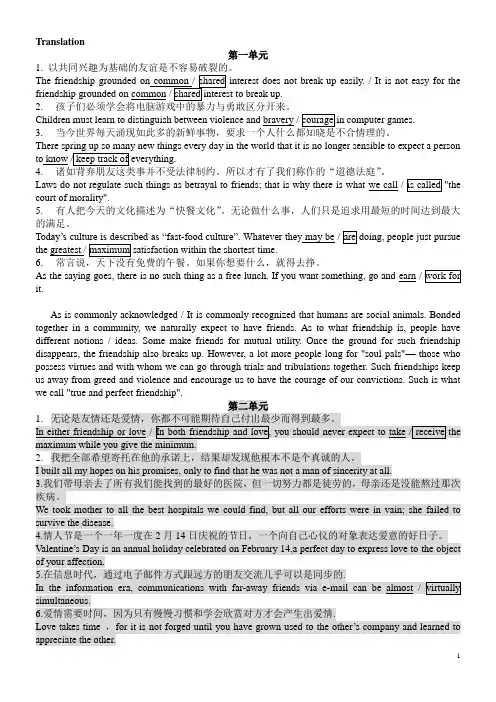
Translation第一单元1.The friendship interest does not break up easily. / It is not easy for the 2.Children must learn to distinguish between violence and bravery / courage in computer games.3.to know / keep track of everything.4. 。
Laws do not regulate such things as betrayal to friends; that is why there is what we call / "the court of morality".5. 有人把今天的文化描述为“快餐文化”。
无论做什么事,人们只是追求用最短的时间达到最大的满足。
st-food culture”. Whatever they may be /the greatest /6.As the saying goes, there is no such thing as a free lunch. If you want something, go and earn /it.As is commonly acknowledged / It is commonly recognized that humans are social animals. Bonded together in a community, we naturally expect to have friends. As to what friendship is, people have different notions / ideas. Some make friends for mutual utility. Once the ground for such friendship disappears, the friendship also breaks up. However, a lot more people long for "soul pals"— those who possess virtues and with whom we can go through trials and tribulations together. Such friendships keep us away from greed and violence and encourage us to have the courage of our convictions. Such is whatAfter dinner, we all sat around the hearth. Aunt Susan was still in the grief of losing Uncle Robert. In her soft voice she told us about their past years. Uncle Robert joined the army shortly after they were engaged. Given the critical situation at the time when lots of army men didn’t return alive, you can imagine how much overjoyed Aunt Susan was to see Uncle Robert come back safe and sound from the European battlefield. Then they got married and brought up five children. For all those years, their affection for each other grew stronger in the course of overcoming difficulties and hardships in life. I was fascinated by Aunt Susan’s story, which was totally different from my idea l of love. They practiced giving and sharing in their daily life instead of pursuing passion and romance. Amazingly, such love lasted through their whole life.第三单元1.千百年来哲学家们费尽心机从各自的角度阐释何为幸福.For thousands of years philosophers have taken pains to illustrate / interpret the meaning of happiness from their own points of view.2.刚上大学的时候,突然发现自己得处理所有日常事物,直到那时自己才觉得在父母身边生活真是幸福。
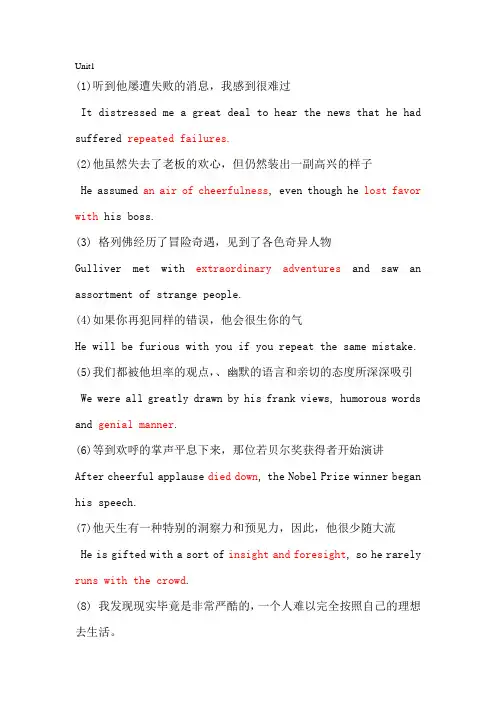
Unit1(1)听到他屡遭失败的消息,我感到很难过It distressed me a great deal to hear the news that he had suffered repeated failures.(2)他虽然失去了老板的欢心,但仍然装出一副高兴的样子He assumed an air of cheerfulness, even though he lost favor with his boss.(3) 格列佛经历了冒险奇遇,见到了各色奇异人物Gulliver met with extraordinary adventures and saw an assortment of strange people.(4)如果你再犯同样的错误,他会很生你的气He will be furious with you if you repeat the same mistake.(5)我们都被他坦率的观点,、幽默的语言和亲切的态度所深深吸引We were all greatly drawn by his frank views, humorous words and genial manner.(6)等到欢呼的掌声平息下来,那位若贝尔奖获得者开始演讲After cheerful applause died down, the Nobel Prize winner began his speech.(7)他天生有一种特别的洞察力和预见力,因此,他很少随大流He is gifted with a sort of insight and foresight, so he rarely runs with the crowd.(8) 我发现现实毕竟是非常严酷的,一个人难以完全按照自己的理想去生活。
I feel realities are all very harsh, so one can hardly live up to his ideals.Unit21.我的顶头上司是典型的工作狂,一年365天每天工作10小时以上My immediate boss is a typical workaholic,for he works for over ten hours each day all the year round.2.校长十分注重课外活动,他认为课外活动有助于培养学生对外部世界的浓厚兴趣。
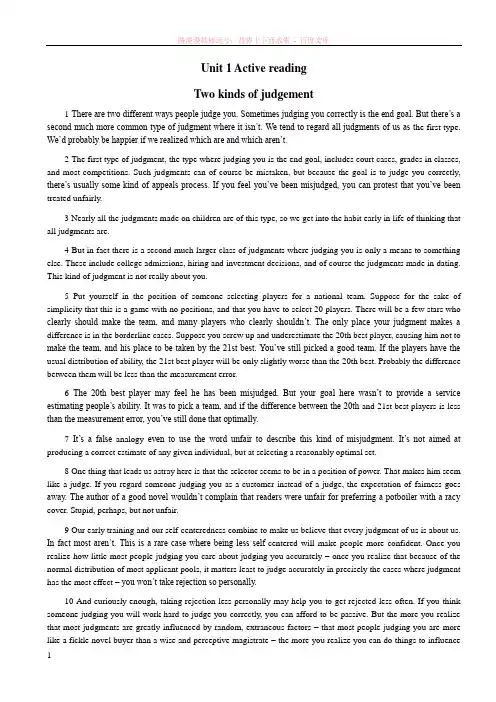
Unit 1 Active readingTwo kinds of judgement1 There are two different ways people judge you. Sometimes judging you correctly is the end goal. But there’s a second much more common type of judgment where it isn’t. We tend to regard all judgments of us as t he first type. We’d probably be happier if we realized which are and which aren’t.2 The first type of judgment, the type where judging you is the end goal, includes court cases, grades in classes, and most competitions. Such judgments can of course be mistaken, but because the goal is to judge you correctly, there’s usually some kind of appeals process. If you feel you’ve been misjudged, you can protest that you’ve been treated unfairly.3 Nearly all the judgments made on children are of this type, so we get into the habit early in life of thinking that all judgments are.4 But in fact there is a second much larger class of judgments where judging you is only a means to something else. These include college admissions, hiring and investment decisions, and of course the judgments made in dating. This kind of judgment is not really about you.5 Put yourself in the position of someone selecting players for a national team. Suppose for the sake of simplicity that this is a game with no positions, and that you have to select 20 players. There will be a few stars who clearly should make the team, and many players who clearly shouldn’t. The only place your judgment makes a difference is in the borderline cases. Suppose you screw up and underestimate the 20th best player, causing him not to make the team, and his place to be taken by the 21st best. You’ve still picked a good team. If the players have the usual distribution of ability, the 21st best player will be only slightly worse than the 20th best. Probably the difference between them will be less than the measurement error.6 The 20th best player may feel he has been misjudged. But your goal here wasn’t to provide a service estimating people’s ability. It was to pick a team, and if the difference between the 20th and 21st best players is less than the measurement error, you’ve still done that optimally.7 It’s a false analogy even to use the word unfair to describe this kind of misjudgment. It’s not aimed at producing a correct estimate of any given individual, but at selecting a reasonably optimal set.8 One thing that leads us astray here is that the selector seems to be in a position of power. That makes him seem like a judge. If you regard someone judging you as a customer instead of a judge, the expectation of fairness goes away. The author of a good novel wouldn’t complain that readers were unfair for preferring a potboiler with a racy cover. Stupid, perhaps, but not unfair.9 Our early training and our self-centeredness combine to make us believe that every judgment of us is about us. In fact most aren’t. This is a rare case where being less self-centered will make people more confident. Once you realize how little most people judging you care about judging you accurately – once you realize that because of the normal distribution of most applicant pools, it matters least to judge accurately in precisely the cases where judgment has the most effect –you won’t take rejection so personally.10 And curiously enough, taking rejection less personally may help you to get rejected less often. If you think someone judging you will work hard to judge you correctly, you can afford to be passive. But the more you realize that most judgments are greatly influenced by random, extraneous factors – that most people judging you are more like a fickle novel buyer than a wise and perceptive magistrate – the more you realize you can do things to influencethe outcome.11 One good place to apply this principle is in college applications. Most high school students applying to college do it with the usual child’s mix of inferiority and self-centeredness: inferiority in that they assume that admissions committees must be all-seeing; self-centeredness in that they assume admissions committees care enough about them to dig down into their application and figure out whether they’re good or not. These combine to make applicants passive in applying and hurt when they’re rejected. If college applicants realized how quick and impersonal most selection processes are, they’d make more effort to se ll themselves, and take the outcome less personally.两种判断1 判断一个人有两种不同的方式,有时判断的最终目的是正确地判断一个人,不过另外一种则不是如此,并且这种判断要常见得多。

新世纪大学英语综合教程3课文翻译Unit one1社会公认的socially acknowledged2在一种情况下in one setting3肤浅的理解 a thin understangding4区分distinguish between5解散break up6追逐个人利益pursue one’s own advantage 7喜欢做某事take please in (doing sth)8到……程度in so far as9建立在……基础上base on /be grounded on10受感情支配be regulated by one’s feelings 11眼前的重要机会opportunity of the moment 12在……相似be similar in(在某方面)13和……相似be similar to14常言道as the saying goes15值得爱be worthy of love16摆脱贪婪be free from greed17物质利益material benefits18相伴为乐enjoy each other’s company 19同样忠诚于share a commitment20高尚品德moral excellence21达成共识develop a share ideaUnit two1难以名状defy definitong2大胆的想法adventurous thoughts3异性the opposite gender4长期计划 a long-term plan5会多或少more or less6安定的生活 a settled life7互相让步give and take8在……的基础上on the foundation of9意见一致 a meeting of minds10传统派the traditional school11培养爱情love need to nurtured12短暂的爱short-live love13质朴的外表the unpretentious looks14一个久远的年代 a bygone era15随大流jump on the boudwagon16心灵的契合mental compatibilities17把……归咎于blame on18弄清楚figure out19扭曲的情感distored emotion20确定重点set prionties21履行承诺honor one’s commitments 22终身不渝的关系life-long bonds。
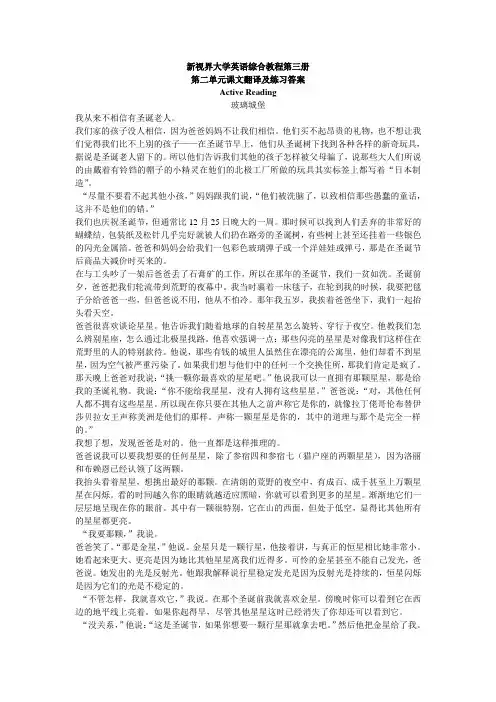
新视界大学英语综合教程第三册第二单元课文翻译及练习答案Active Reading玻璃城堡我从来不相信有圣诞老人。
我们家的孩子没人相信,因为爸爸妈妈不让我们相信。
他们买不起昂贵的礼物,也不想让我们觉得我们比不上别的孩子——在圣诞节早上,他们从圣诞树下找到各种各样的新奇玩具,据说是圣诞老人留下的。
所以他们告诉我们其他的孩子怎样被父母骗了,说那些大人们所说的由戴着有铃铛的帽子的小精灵在他们的北极工厂所做的玩具其实标签上都写着“日本制造”。
“尽量不要看不起其他小孩,”妈妈跟我们说,“他们被洗脑了,以致相信那些愚蠢的童话,这并不是他们的错。
”我们也庆祝圣诞节,但通常比12月25日晚大约一周。
那时候可以找到人们丢弃的非常好的蝴蝶结、包装纸及松针几乎完好就被人们扔在路旁的圣诞树,有些树上甚至还挂着一些银色的闪光金属箔。
爸爸和妈妈会给我们一包彩色玻璃弹子或一个洋娃娃或弹弓,那是在圣诞节后商品大减价时买来的。
在与工头吵了一架后爸爸丢了石膏矿的工作,所以在那年的圣诞节,我们一贫如洗。
圣诞前夕,爸爸把我们轮流带到荒野的夜幕中。
我当时裹着一床毯子,在轮到我的时候,我要把毯子分给爸爸一些,但爸爸说不用,他从不怕冷。
那年我五岁,我挨着爸爸坐下,我们一起抬头看天空。
爸爸很喜欢谈论星星。
他告诉我们随着地球的自转星星怎么旋转、穿行于夜空。
他教我们怎么辨别星座,怎么通过北极星找路。
他喜欢强调一点:那些闪亮的星星是对像我们这样住在荒野里的人的特别款待。
他说,那些有钱的城里人虽然住在漂亮的公寓里,他们却看不到星星,因为空气被严重污染了。
如果我们想与他们中的任何一个交换住所,那我们肯定是疯了。
那天晚上爸爸对我说:“挑一颗你最喜欢的星星吧。
”他说我可以一直拥有那颗星星,那是给我的圣诞礼物。
我说:“你不能给我星星,没有人拥有这些星星。
”爸爸说:“对,其他任何人都不拥有这些星星。
所以现在你只要在其他人之前声称它是你的,就像拉丁佬哥伦布替伊莎贝拉女王声称美洲是他们的那样。
Unit 1Put in Use : Practice 1Unit 11.她一家商店一家商店的看,最后以她能付出的价格买了她所需要的东西。
She shopped around till she got what she wanted at a price she could afford.2.除了向我要东西,他从不跟我说话。
He never speaks to me other than to ask for something.3.你永远应该以搞好你的工作为目的。
You should always aim at doing your job well.4.几个星期来她一直呆在家中照顾有病的父亲。
She has been tied to the house for weeks looking after her invalid father.5.修建这条路是为了缓解交通拥挤。
The route was designed to relieve traffic congestion.6.社会是由形形色色的人组成的。
有些人很好,有些人很坏,也有些人介乎两者之间。
Society is made up of a wide variety of people; some are good, others (are) bad, and still others (are) in between.Unit 251.这个星期你每天都迟到,对此你如何解释?How do you account for the fact that you've been late every day this week?2.政府已经承诺改善落后地区人民的生活条件。
The government has committed itself to improving the life conditions of the people living in the underdeveloped areas.3.据最新报道,这次火车交通事故造成多名乘客死亡。
UNIT 11.无论你是多么富有经验的演说家,无论你做了多么充分的准备,你都很难在这样嘈杂的招待会上发表演讲。
(no matter how)No matter how experienced a speaker you are , and well you have prepared your speech, you will have difficulty making a speech at such a noisy reception.2.就像吉米妹妹的朋友都关心吉米一样,吉米也关心他们。
(just as)Just as all sister’s friends cared about him, Jimmy cared them.3.汽车生产商在新车的几处都印有汽车识别号码,以便帮助找回被盗的车辆。
(track down)Car manufactures stamp a vehicle identification number at several places no new cars to help track down stolen vehicles.4.老师回来时你敢告我状的话,我就不再和你说话了。
(tell on)If you dare tell on me when the teacher gets back I won’t say a word to you anymore.5.有些老年人愿意独自过日子,但大多数老人选择和儿女一起生活。
(on one’s own)Some elderly people prefer to live on their own while the great majority choose to live with their children.6.现在需要面对的事情是:如何筹集建公司所需的资金。
(reckon with)Here is something that needs to be reckoned with how to get the necessary finances to establish the company.UNIT 21.被告是位年仅30岁的女子,她坚持称自己无罪。
1. 我们没有必要太在乎别人对我们的评价,因为他们的评价不一定是客观公正的。
(in that; objective)We do not need to care too much about what people say about us in that what they say is not necessarily objective. 2. 为了自身发展,他换了不少工作,并最终找到了适合自己的职位。
但他的经历并不适用于每个人。
(for the sake of; apply to)He changed quite some jobs for the sake of his self-development before he finally found a position suitable for him. But his experience does not apply to everyone.3. 在为自己设定目标之前,首先要弄清楚自己真正需要的是什么。
对自己的需要越了解,越容易设定切实可行的人生目标。
(figure out; the more … the more …)We should first figure out what we really need before we set goals for ourselves. The more we know about what we need, the easier it is to set practical goals.4. 大部分雇主关心的不是你自我能力的提升,而是你能为公司作多大贡献。
(what …; not … but …)What most employers care about is not your self-improvement, but what you contribute to the company.5. 无论结果如何,都不要轻言放弃。
不能因为一次求职失败就低估自己的能力。
(whatever; outcome; underestimate)Whatever the outcome will be, do not give up easily. We should not underestimate our ability / ourselves just because of one failure in seeking employment.英译中1. The first type of judgment, the type where judging you is the end goal, includes court cases, grades in classes, and most competitions.第一种判断,即把正确地判断一个人作为最终目的的判断,包括法院判决、考试成绩及大部分比赛。
2. It’s not aimed at producing a correct estimate of any given individual, but at selecting a reasonably optimal set. 在此目的不是为了对某个特定的个体作出正确的评估,而是选择合理的最佳组合。
3. Our early training and our self-centeredness combine to make us believe that every judgment of us is about us.我们早年所受的训练,加上总是以自我为中心,使我们认为对我们所作的每个判断都是关于我们本身的判断。
4. And curiously enough, taking rejection less personally may help you to get rejected less often. Language in Use 令人惊奇的是,把被拒绝看得不那么针对个人,能帮助你更少地遭到拒绝。
我们早年所受的训练,加上我们总是以自我为中心,使我们认为对我们所作的每个判断都是关于我们本身的判断。
5. If college applicants realized how quick and impersonal most selection processes are,they’d make more effort to sell themselves, and take the outcome less personally.如果大学申请人意识到大部分选择过程是多么迅速、多么不考虑个体需求,他们就会更努力地推销自己,并能更加坦然地对待录取结果。
1.小时候,我住的村庄四周是一片田野,但现在已不见当年的影子,原来的村庄已变成一座现代城镇。
(nothing but; what-clause)When I was a child, the village I lived in was surrounded by nothing but open fields. But now nothing remains of the village. A modern city is built on what used to be there.2. 我的童年是在乡下度过的,那时的天很蓝,晚上仰望夜空,能看到无数的星星。
(look up to)My childhood was spent in the countryside. At that time the skies were clear. Looking up to the sky at night, I could s ee countless stars.3. 他上小学时,家境贫寒,总担心同学们会看不起他。
事实上,他的担心是多余的,同学们对他都很友好。
(look down on sb)His family was poor when he was an elementary school student, and he often worried that his classmates would look down on him. In fact his worry was unnecessary, for all his classmates were friendly to him.4. 每个人在成长的过程中都要经历很多事,大部分被遗忘了,但有些永远印在我们的脑海里。
(while) Everyone is bound to experience a lot of things when growing up, most of which will be forgotten while some will re main in our mind forever.5. 童年是一个五彩斑斓的盒子,里面装着许多美丽的梦想和有趣的回忆。
(in which)Childhood is a colourful box, in which are beautiful dreams and interesting memories.英译中1 They couldn’t afford expensive presents, and they didn’t want us to think we weren’tas good as other kids who, on Christmas morning, found all sorts of fancy toys under the tree that were supposedly le ft by Santa Claus. 他们买不起昂贵的礼物,也不想让我们觉得我们比不上别的孩子——在圣诞节早上,他们从圣诞树下找到各种各样的新奇玩具,据说是圣诞老人留下的。
2 I had a blanket wrapped around me, and when it was my turn, I offered to share it with Dad, but he said no thanks. The cold never bothered him.我当时裹着一床毯子,在轮到我的时候,我要把毯子分给爸爸一些,但爸爸说不用,他从不怕冷。
3. Those shining stars, he liked to point out, were one of the special treats for people like us who lived out in the wild erness. 他喜欢强调一点:那些闪亮的星星是对像我们这样住在荒野里的人的特别款待。
4 The longer you looked and the more your eyes adjusted to the dark, the more starsyou’d see, layer after layer of them gradually becoming visible. 的时间越久你的眼睛就越适应黑暗,你就可以看到更多的星星。
渐渐地它们一层层地呈现在你的眼前。
5. didnt have any moons or satellites or even a magnetic field, but it did have an atmosphere sort of similar to earth’s, except it was super-hot — about five hundred degrees or more. 金星没有像月亮那样的卫星或其他卫星,甚至没有磁场,但它有着与地球相似的空气,只是它的空气超热,大约有五百度甚至更高。
1. 大城市是他最不愿意居住的地方,因为他无法忍受那里的拥挤的喧闹。
(the last place…that…;bustling)The big city is the last place that he wishes to live in, for it is so bustling and crowded there that he finds it hard to bear.2. 现代生活的快节奏意味着人们没有更多的时间用于人际交往,因此人与人之间显得很淡漠。
(not + present participle hence)The fast pace of modern life means people not having enough time for personal communication; hence the indifferen ce between people.3. 过去邻居们经常互相串门,但现在大家都习惯把自己关在各自的家里,没什么事几乎不来往。